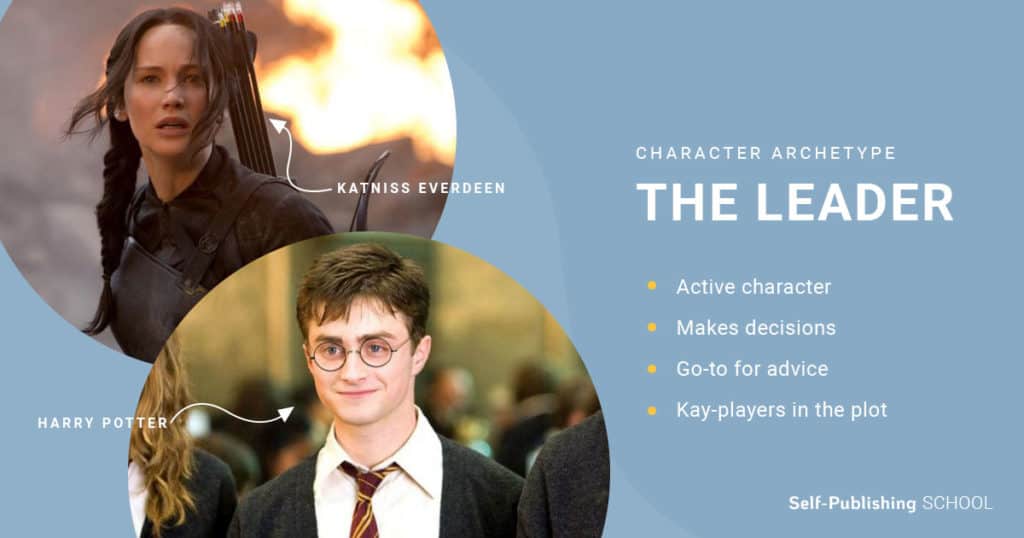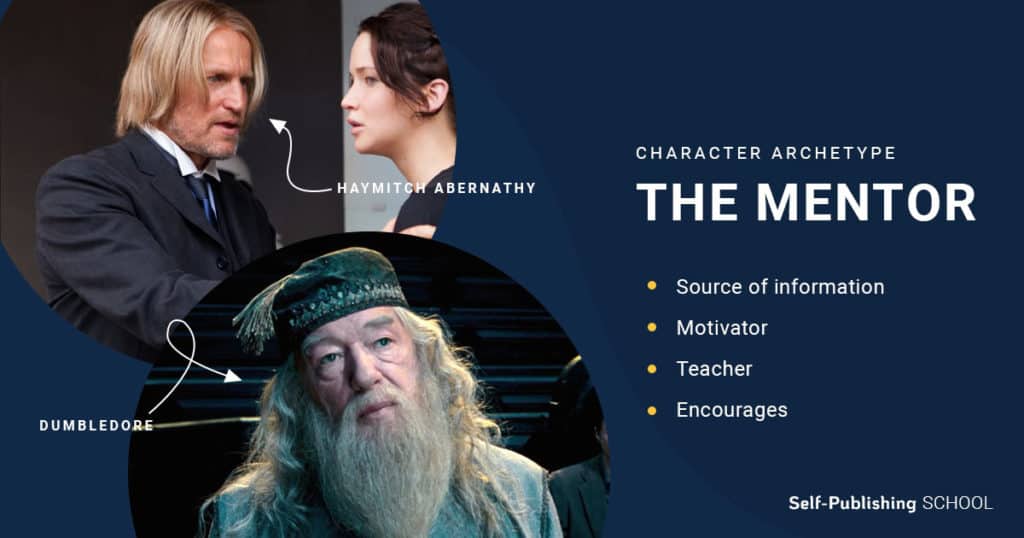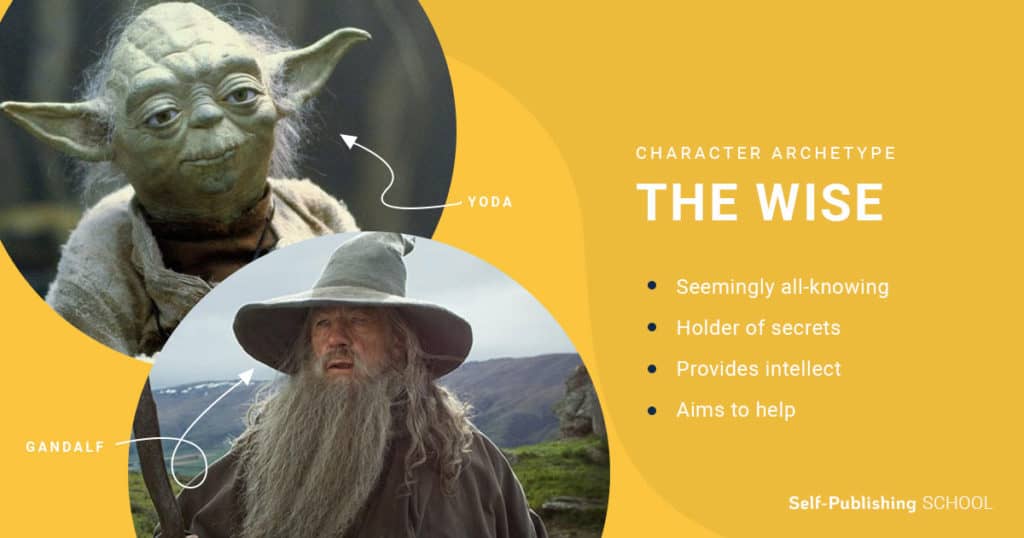Character archetypes are used for many reasons. If you’re here, you’re likely looking for one of a few possible things:
- To create a more well balanced character cast
- To further develop an archetype you think you have
- To do justice to the archetype you’re already going for
- To have a model for tried-and-true lovable characters
These archetypes are known and used for a reason. Even if you custom create a character, they may still fall under one of these archetypes because of their role in your story. And while many stories are highly unique, they still tend to follow a certain structure.
That structure relies on certain character taking certain actions.
Which is what a character archetype is at the end of the day.
So no matter your need for these character archetypes, we’ll help you do them well.
Here are the 14 archetypes we’ll cover in detail:
- The Leader
- The Outsider
- The Caregiver
- The Rebel
- The Mentor
- The Professor
- The Warrior
- The Hunk
- The Wise
- The Orphan
- The Hero
- The Jester
- The Seducer
- The Bully
What is a character archetype?
A character archetype is a typical character that represents specific actions, nuances, and characteristics, and can also be known as “character tropes.” These characters have well-known qualities that shape their narrative and the story.
There are many characters that have similar and recurring qualities that are easy to recognize in stories.
Writers use these archetypes to give their story shape and direction. While each of the character archetypes should be written uniquely and given their own qualities (which we’ll teach you below), they will still fulfill a specific purpose in your story. That purpose is shared amongst that specific archetype.
Take mentors or professors for example. This can include any “wise one” who’s a resource for support and knowledge for the main character.
We’ll cover more of this in that section below, but Albus Dumbledore is a great example of this character archetype.
But you do want to be careful you don’t then utilize stereotypes instead.
Character Archetypes VS Stereotypes: What’s the difference?
Writing a “stereotypical” bully and writing a character archetype that’s the bully aren’t the same thing.
Even if we take a look at the root meaning of both words, they can shed some light on the differences, and why two terms exist anyway.
“Archetype” is derived from the Greek word “arkhetupon” meaning, “something moulded first as a model”. So we can understand that an archetype is a model of something. In this case, character archetypes are a model of a certain character.
“Stereotype” on the other hand, is derived from the French “stéréotype“, which translates to “printed by means of a solid plate of type”. This referred to a specific method of printing that utilized the same plate so you could duplicate something exactly. A copy, essentially.
Notably, a model is not identical, whereas a duplicate of something is. You might use a model of something to begin with, but always alter and change its appearance or other traits until it’s uniquely yours.
A stereotype is consistent in both traits and role, the same throughout, a duplicate. Character archetypes vary, but fulfill the same role, and are used as a model for a type of character.
What we want to avoid in fiction is using stereotypes to fulfill a role. That’s where you get in trouble by crafting offensive characters used for a single purpose. And quite frankly, it’s lazy.
You’re more creative than that.
So let’s take a look at some examples of character archetypes and why they’re done well, and aren’t stereotypes.
Examples of Character Archetypes
We’ll go over multiple examples for all of the 14 character archetypes below, but here are a few to get you started:
- The Mentor – Gandalf from The Lord of the Rings by J.R.R. Tolkien
- The Sidekick – Ron Weasley from the Harry Potter series
- The Rebel – Katniss Everdeen from The Hunger Games by Suzanne Collins
- The Wise – Albus Dumbledore from the Harry Potter series
- The Jester – The Genie from Aladdin
- The Warrior – Maximus Decimus Meridius from Gladiator
- The Rebel – Robin Hood from various stories and adaptations
- The Leader – Indiana Jones from the Indiana Jones series
- The Caregiver – Atticus Finch from To Kill a Mockingbird by Harper Lee
These are just a few examples, of course.
So let’s dive in to all of the character archetypes, examples of each, and tips for writing them well.
14 Character Archetypes You’ll Want to Know, Use, and do Justice
You can look in every movie and book and pick out at least three character archetypes used by the author/s. The key is knowing which go together, which clash, and how to shape them to create your own unique character in your novel.
Not every story needs character archetypes, and having a few doesn’t mean your characters aren’t well-rounded or unique. At the same time, your cast can also have multiple qualities of these character archetypes, which adds to their complexity.
Character archetypes are used in order to ensure your character cast is diverse, while also fulfilling plot and story structure needs.
There are certain elements every good story needs in order to satisfy readers and character archetypes are a big part of what does that.
That’s why we’re covering 14 character archetypes to think about when writing a novel.
1. The Leader
The leader is a well-known and one of the most widely used of the character archetypes for a number of reasons.
Firstly, this archetype is always active, meaning they don’t allow things to happen to them but rather, they move the plot forward through decisions and their own actions. Passive characters tend to follow orders, while active ones make the choices and give the orders.
You’ll often find that main characters often possess the qualities of a leader, which makes for an alluring book.
This is one of the character archetypes that’s easiest to make your own. Leaders can do so in many ways. There’s no specific method used to lead. So long as they’re a leader, they fit the type.
Qualities of a The Leader character archetype:
- Active and not a passive character
- Makes decisions for other characters
- Leads the “charge” in almost all scenarios
- Is the go-to character for advice
- Can grow into the leadership role if they’re not there right away
- They are typically a key-player in the plot and overall story
Examples: The Leader Archetype
For more clarity, here are some recognizable examples of this character archetype where you can easily identify these traits.
Harry Potter in the Harry Potter series by J.K. Rowling – Throughout the series, Rowling paint Harry as a leader in several ways. We first see him as less than a leader, living under the stairs but as the story progresses, his leadership shines in several ways. Firstly, he decides to forgo friendship with Draco Malfoy because, well, he doesn’t believe him to be a good person. This sets the stage for even more leadership characteristics as he stands up to Snape, and ultimately takes on Voldemort in the end. His leadership continues to grow as he leads his friends and classmates through difficult times in the series.
Katniss Everdeen in The Hunger Games trilogy by Suzanne Collins – The first act of leadership we see from Katniss is the very beginning of the story. She is hunting for her family…so they can eat. It’s a very basic form of leadership that’s necessary due to her mom’s state after her father passes away. We continue to see her leadership flourish as she volunteers as tribute, sets a precedent of distaste for the games, and ultimately saves both her own and Peeta’s life by the end of the first book.
Tobias Kaya in The Savior’s Champion by Jenna Moreci – Tobias begins the book as a provider for his family. This leadership role is necessary due to his sister’s disability. As the book progresses and Tobias enters the deadly tournament, allies seem to be his only means of survival. He bands together (somewhat reluctantly) with a few key competitors and soon finds himself as the voice of their group, making decisions out of instinct without even realizing the position he’s in.

2. The Outsider / Wildcard
This is one of the character archetypes that serves a very distinct purpose. Oftentimes, this is a character that adds a layer of mystery and intrigue to the story. Not to mention trouble. And where there’s trouble, there’s conflict.
For example, this character won’t be “close” to your main character or even other secondary characters. They often come into the story to aid or solve a specific issue, but can also be seen as untrustworthy.
Examples: The Outsider Archetype
Johanna Mason in The Hunger Games trilogy – Johannah Mason meets Katniss and Peeta during the opening of the 75th Hunger Games. Wild, unpredictable, and untrustworthy is our first reactions to her, solidifying her as one of these character archetypes. Because her character is so unpredictable, we’re both worried and interested in what she’ll do next, which increases the tension when she appears on the page.
Luna Lovegood in the Harry Potter series – Luna Lovegood is a very important character in the Harry Potter series but is often seen as an outsider not only from her own perspective but from others. She’s definitely one of these character archetypes as we can’t predict her behavior. We don’t really know what she’ll do next and this adds to the intrigue of any scene she’s in.
3. The Caregiver
This character archetype speaks for itself. The caregiver is essentially the character who serves to take care of others. Most often, you’ll see one of these character archetypes as women. Which can unfortunately leak into stereotype territory if you’re not careful.
They often have qualities that are “parently” and can be the voice of reason when the plot thickens. This character is one others often turn to for help, reassurance, and even encouragement. A character archetype like this in a story can be a place of calm, soothing, and can also serve as great juxtaposition to heavier and more tense moments.
Characters may also wonder how they’d get through what they have without this one character ensuring their safety and wellbeing.
Examples: The Caregiver Archetype
Louisa Clark in Me Before You – The main purpose of this character’s role is to be a caretaker. Her job in the story is to care for a disabled man. The characteristics she possesses in the story are directly in line with these character archetypes of being a voice of reason, encouragement, and caring for others in the story.
Hermione Granger in the Harry Potter series – While Hermione’s character serves several purposes throughout the story, a major contributing factor to her narrative is the care she takes of both Ron and Harry. How many times throughout the series do the two of them even say, “What would I do without you?” This is a common reaction to the caretaker character archetype.
4. The Rebel
Many main characters can fall under The Rebel character archetype because this trait often leads to interesting and intriguing conflict readers latch onto. And this is one of the more popular character archetypes in young adult stories, specifically for the male love interests.
Keep in mind, however, that this is also a great archetype to use for villains or antagonists.
The qualities that make up some of The Rebel character archetypes are exactly what you’d expect; the characters often go against the grain, resist rules, regulations, and orders, as well as follow their own paths.
Examples: The Rebel Archetype
Fred and George from the Harry Potter series – While Fred and George, twin brother of Ron Weasley in the series, are also known as The Jester character archetypes (which we’ll cover below), they’re primarily rebels as well. The most infamous instance that showcases this is in book 5 when Delores Umbridge takes over. They drive her out with their own invented pranks, “sticking it to the man” in the way they know how best.
Katniss Everdeen in The Hunger Games trilogy – Katniss may not have thought herself a rebel at first, but her actions quickly showcase her natural rebel side. From threatening to eat Nightlock berries at the end of the first book to actually leading the rebellion as a whole, she’s The Rebel through and through.
5. The Mentor
One of the most iconic (and sometimes clichéd) character archetypes in stories is The Mentor.
I’m sure many examples are already popping up in your mind for this one. A classic example of this is Albus Dumbledore in the Harry Potter series.
The Mentor character archetype is someone who serves as a source of information, motivation, support, and encouragement usually for the protagonist or that group in a novel. This is one of the character archetypes you’ll want to get the more creative with. They don’t have to be like others.
In fact, flip a trope on its head if you dare.
This character is also commonly used as an exposition element in the sense that they can provide information to the protagonist that the audience also needs to know, but in a natural way that doesn’t feel like “info-dumping.”
Examples: The Mentor Archetype
Albus Dumbledore in the Harry Potter series – As mentioned above Albus Dumbledore is a prime example of a mentor in this series. He guides, teaches, supports, and encourages not only Harry, but several students he grew close to throughout the series.
Haymitch Abernathy in The Hunger Games trilogy – This may be unclear at first, but Haymitch is literally and figuratively The Mentor in this trilogy. His character literally mentors Katniss and Peeta in the games as his duty but later mentors them in ways unrelated to the games by offering advice and taking on their personal conflicts.

6. The Professor
The Professor and The Mentor are very similar character archetypes. However, with The Professor the emphasis is on their role as an educator and teacher instead of just a mentor.
Therefore, Dumbledore can be seen as The Professor, though another character occupies that role in this series.
This is one of the character archetypes who’s usually a teacher or educator the main character grows close to. The key defining factor is that The Professor both teaches in a formal way, but also takes an interest in aiding your character’s personal life and journey. They offer guidance and help when the characters need it most and can be a go-to for information for your characters.
Examples: The Professor Archetype
John Keating in Dead Poet’s Society – In this iconic story, Professor Keating guides his students on a journey through poetry…and adolescence. Not only does he teach his students poetry in a way they can understand and appreciate, he’s also instrumental in developing Todd Anderson, the main character and student. This makes him one of the character archetypes you’ll want to model after.
Professor McGonagall in the Harry Potter series – This archetype is evident in Professor McGonagall as well. Her role is to be an educator and to hold students to the highest standard, pushing them and even creating conflict within the story.
Mr. Bruner in The Edge of 17 – Mr. Bruner is Nadine’s teacher and also someone she goes to for guidance in her personal life. He not only serves as her educator in school, but he’s a confidant for Nadine’s personal problems and helps her get through them.
7. The Warrior
When you think of one of these character archetypes, it’s very evident which characters fall under this category. But you’ll want to be on alert for stereotypes here too.
Think of the best warriors in any movie where they appear. Those characters are often tough, confident, and skilled in combat. Many army officers, commanders, and persons in charge of armies will occupy warrior character archetypes.
But a character doesn’t need to be in a role of combat or military in order to be The Warrior. They can possess qualities of a warrior without the title.
The Warrior can also be both a good or bad character.
Examples: The Warrior Archetype
Gray Worm in the Game of Thrones series – Chosen to lead the Unsullied under command of Daenarys Stormborn in this series because he “has no fear,” his character is the epitome of The Warrior. He is fierce, skilled, battle-ready, and willing to do whatever it takes to accomplish what he wants and needs to.
Cinna in The Hunger Games series – This might be a very underrated quality of Cinna’s in this series with The Warrior traits not evident upon first glance. But we later learn how instrumental this character’s role is to rebelling against the Capitol, marking him just as deserving of the title “warrior” as anyone on the battlegrounds.
8. The Hunk
Also known as “The Adonis,” character archetypes like this are often the stereotypical “hot guy” in stories. Which you want to be careful of. Give them more variety!
While he may also serve other roles, this character is a distraction (often to the main character) and is usually the love interest in stories.
This character can go one of two ways. You can have the stereotypical hunk who is unintelligent and only gets by on their looks, or he can be the hot guy who is misunderstood and has more going for him than people believe. Remember to focus on character archetypes, not stereotypes.
Either way, the main factor is that he’s very handsome to the point of distraction.
Examples: The Hunk Archetype
The Adonis in The Savior’s Champion by Jenna Moreci – In the Sovereign’s Tournament, a competition to the death to win the hand of The Savior, there are several competitors, one of which is nicknamed The Adonis. This character is very much the stereotypical hunk with no brains, and it serves a very distinct purpose in this novel. It’s an examples of one these character archetypes, but does border on stereotype. He’s a fan-favorite of the spectators and stirs up jealousy amongst the competitors.
Christian Gray in 50 Shades of Gray – On the other hand, this character is more in line with the second version of The Hunk, a hot guy with more to him than meets the eye. Christian Gray is written as being so attractive, it turns heads when he walks by. But he’s also a billionaire businessman with a lot more than meets the eyes. He’s very smart while being a hunk, and then some. Certainly of these character archetypes, but more nuanced.
Cedric Diggory in the Harry Potter series – This character serves as a mix of both types of The Hunk. He is a competitor in the Triwizard Tournament, and the ladies love him. He’s handsome, charismatic, and also a highly intelligent and skilled wizard. All of these add to the conflict of Harry competing because others root for Cedric and not him, creating issues at school and in his personal life. Not to mention the fact that Harry’s crush ends up dating Cedric.
9. The Wise
This character archetype is someone who often serves as a destination for characters in adventure or epic novels.
You may recall stories of characters needing to travel to meet this “Wiseman” who could tell them what to do or where to go next.
With a character like this, their role in their personal life is also in line with being The Wise in the sense that they also serve as aid, advice, and intellect outside of your main character’s needs.
Examples: The Wise Archetype
Gandalf in the Lord of the Rings Series – While this character also serves as The Mentor, it’s important to note that he’s a very wise, all-knowing character as well. Throughout the series, he proves himself a source of information for several characters.
Yoda in the Star Wars franchise – We can’t talk about The Wise without mentioning Yoda, one of the “wise man most in books.” He knows the most, aids anyone he comes by in their efforts, and is a classic example of The Wise character archetype.

10. The Orphan
While many authors aren’t bad people, we do tend to put our main characters through the wringer and orphaning them is one of the top ways to create sympathy for the character…and we all know that doing that makes readers love them more.
There are so many examples of characters whose parents passed away shortly after they were born or even later, into their teen years.
The most distinguishing factor for this character archetype is that the loss of their parents, whether it when they’re a baby or adult, has to add to the conflict of the story, including internal problems. If the story can exist as-is without their deaths, it’s not useful for the parents to be dead.
Examples: The Orphan Archetype
Tony Stark from The Marvel comics – Although Stark loses his parents at the age of 21, this plays a big role in who he is in the franchise. After they pass, he has to take over his father’s company, where he grows into the person we really know him as: Ironman. Their death also plays a pivotal plot point in storylines later as well.
Harry Potter in the Harry Potter series – Harry’s parents died when he was a baby but they left before something so important, the series could not have been written as-is without it: Harry’s scar and connection to Lord Voldemort. Their deaths catapulted the entire conflict of the story, and it also causes him internal conflict in that he struggles with his identity due to their absence.
Snow White – We all know this story. Because her mom dies, her father has to remarry, which puts her in the path of Maleficent, the villain of this story.
11. The Hero
The Hero is one of the most common character archetypes there is in stories, and this is because good stories often have a “triumphant” character who prevails over evil and save others.
Many heroes also embody other character archetypes as well.
The best defining factor for The Hero is that they save others through their actions against the antagonist.
Examples: The Hero Archetype
Here’s a long list of The Hero character archetypes:
- Harry Potter
- Katniss Everdeen
- Marvel Superheroes
- Matilda Wormwood in Matilda
- Huckleberry Finn
- Beowulf
- Atticus Finch
- Neville Longbottom
- Hermione Granger
- Ron Weasley
- The entire Order of the Phoenix
- Peeta Mellark


Book Outline Generator
Choose your Fiction or Nonfiction book type below to get your free chapter by chapter outline!
Book Outline Generator
Enter your details below and get your pre-formatted outline in your inbox and start writing today!
CONGRATULATIONS
Thanks for submitting! Check your email for your book outline template.
In the meantime, check out our Book Outline Challenge.

12. The Jester
If your favorite character in stories is ever the goofball who’s really funny, they’re likely The Jester character archetype.
This type of character has a few jobs, the main one being comedic relief. They can serve as a strong literary device to cut the tension in order to give characters a relief, or to distract from something worse coming up. This is much different than another common archetype called the trickster.
A couple of key identifiers of The Jester in stories is that they cut tension either with what they say or do, are the butt of every joke, or make others the butt of every joke. The Jester’s job is to elicit laughs and keep the scene and mood light.
Examples: The Jester Archetype
Fred and George Weasley in the Harry Potter series – We’ve already talked about these rebels but they’re also very much Jesters for this series. They make jokes and even pull pranks, both of which lighten the mood of a story that’s very dark.
Fat Amy in Pitch Perfect – The story of Pitch Perfect is made hilarious by Fat Amy, one of the main characters. She adds jokes, comedy by the way her character acts, and generally brings the story to a new level of funny.
Dory in Finding Nemo – We’ve all laughed at Dory in this story. Because of her short memory, there are plenty of moments for jokes and laughter, not to mention her character’s general demeanor.
13. The Seductress/Seducer
With this character archetype, there’s a very specific goal of the seducing behavior. This is a big cautionary archetype! You can create stereotypes here, and it’s important to craft full, realistic characters for this one.
Most often, this is one of the character archetypes who’s attractive and can seduce someone in order to get something they want, or even to subdue them in order to do this.
The main point of The Seducer archetype is to trick someone into being vulnerable in order to gain the upper hand in any type of situation, whether that’s life or death or simply getting out of a speeding ticket. This is also one of the character archetypes highly utilized in spy thrillers with the purpose of gaining information.
Examples: The Seductress/Seducer Archetype
Dominika Egorova in Red Sparrow – This character archetype for this movie is quite unique. While her character, with the alias of Katerina, may not have been this type to start, she is taught this very specific skill in order to achieve her goals as a spy.
Black Widow in the Marvel comics – Similar to the previous example, this character was trained in many art forms, seducing being one of them. Her character often has to seduce men, playing to their deepest desires, in order to extract information for the intelligence agency she works with.
14. The Bully
We all know a bully in real life and stories have no exception to their presence. Of the character archetypes, this one is easy to stop.
It’s is often used to make your main character’s life a lot harder. They can be a bully physically or even emotionally. As long as they belittle your character to the point of increasing conflict in the story, they’re The Bully.
Examples: The Bully Archetype
Draco Malfoy in the Harry Potter series – From the get-go, Draco Malfoy has bullied Harry Potter and his friends. He puts them down, tries to disrupt them with their plans, and even tries to have Harry killed (and kill him himself) later in the series.
Regina George in Mean Girls – This character is the epitome of a bully. She puts others down and makes them feel like less than, so much so that the climax of the movie comes to a head with her “burn book,” which consists of a diary of bullying comments about others.
Patty in Diary of a Whimpy Kid –There are several bullies in this story, the main character’s own brother being one, but Patty indeed holds this title as well. She consistently bullies Greg throughout the story.
At the end of the day, character archetypes are meant to be examples you can use and tailor to fit your story. They work well because they’re familiar; people know, trust, and like them! This can bode well for you and your journey to write and publish books and series.


Book Outline Generator
Choose your Fiction or Nonfiction book type below to get your free chapter by chapter outline!
Book Outline Generator
Enter your details below and get your pre-formatted outline in your inbox and start writing today!
CONGRATULATIONS
Thanks for submitting! Check your email for your book outline template.
In the meantime, check out our Book Outline Challenge.
